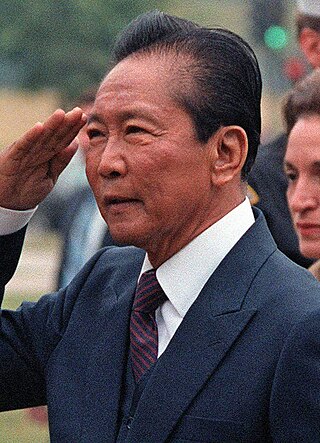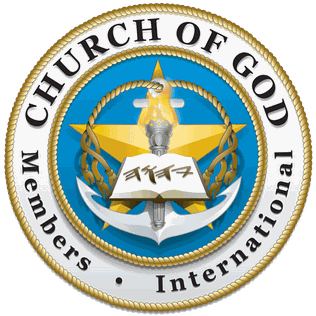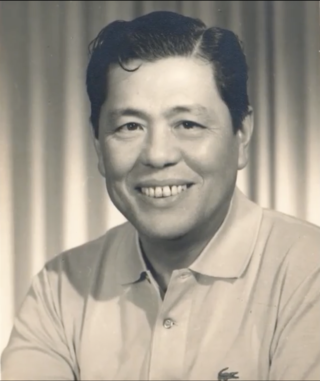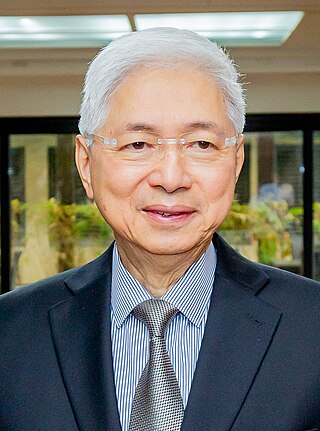Related Research Articles

Ferdinand Emmanuel Edralin Marcos Sr. was a Filipino politician, dictator and kleptocrat who served as the tenth president of the Philippines from 1965 to 1986. Marcos ruled the country under martial law from 1972 to 1981, and with vastly expanded powers under the 1973 Constitution until he was deposed by a nonviolent revolution in 1986. Marcos described his rule's philosophy as "constitutional authoritarianism" under his Kilusang Bagong Lipunan. One of the most controversial figures in Filipino history, Marcos's regime was infamous for its corruption, extravagance, and brutality.

Maria Corazon "Cory" Sumulong Cojuangco-Aquino was a Filipino politician who served as the eleventh President of the Philippines from 1986 to 1992. She was the most prominent figure of the 1986 People Power Revolution, which ended the two-decade rule of President Ferdinand Marcos and led to the establishment of the current democratic Fifth Philippine Republic.

Benigno "Ninoy" SimeonAquino Jr., was a Filipino politician who served as a senator of the Philippines (1967–1972) and governor of the province of Tarlac. Aquino was the husband of Corazon Aquino, who became the 11th president of the Philippines after his assassination, and father of Benigno Aquino III, who became the 15th president of the Philippines. Aquino, together with Gerardo Roxas and Jovito Salonga, helped form the leadership of the opposition towards then President Ferdinand Marcos. He was the significant leader who together with the intellectual leader Sen. Jose W. Diokno led the overall opposition.

The People Power Revolution, also known as the EDSA Revolution or the February Revolution, was a series of popular demonstrations in the Philippines, mostly in Metro Manila, from February 22 to 25, 1986. There was a sustained campaign of civil resistance against regime violence and electoral fraud. The nonviolent revolution led to the departure of Ferdinand Marcos, the end of his 20-year dictatorship and the restoration of democracy in the Philippines.

San Miguel Corporation, abbreviated as SMC, is a Philippine multinational conglomerate with headquarters in Mandaluyong, Metro Manila. The company is one of the largest and most diversified conglomerates in the Philippines. Originally founded in 1890 as a brewery, San Miguel has ventured beyond its core business, with investments in various sectors such as food and drink, finance, infrastructure, oil and energy, transportation, and real estate.

The Liberal Party of the Philippines abbreviated as the LP, is a liberal political party in the Philippines.

The Members Church of God International, abbreviated as MCGI, is an international Christian religious organization with headquarters in the Philippines. It is popularly known in the Philippines as Ang Dating Daan, the title of its flagship radio and television program and the longest-running religious program in the Philippines which was hosted by Eli Soriano, MCGI's "Overall Servant" until his death in 2021.

Eliseo "Eli" Fernando Soriano was a Filipino preacher and televangelist. He was the "Overall Servant" of the Members Church of God International (MCGI), an international Christian religious organization with headquarters in Apalit, Pampanga, Philippines. He was the main host of the radio and television program Ang Dating Daan, which is considered as the longest-running religious program in the Philippines.

The Partido Demokratiko Pilipino is a syncretic political party in the Philippines founded in 1982. It was previously known as Partido Demokratiko Pilipino–Lakas ng Bayan (PDP–Laban) from 1983 to 2024 as a result of a merger with Lakas ng Bayan (Laban). It was part of the country's ruling party coalition from 1986 to 1992 under the administration of Corazon Aquino and the country's ruling party from 2016 to 2022 under the administration of Rodrigo Duterte.

A parliamentary election was held in the Philippines on April 7, 1978, for the election of the 165 regional representatives to the Interim Batasang Pambansa. The leading opposition party, the Lakas ng Bayan (LABAN), ran twenty-one candidates for the Metro Manila area. Their leading candidate was the jailed opposition leader Ninoy Aquino. Marcos regime's party known as the Kilusang Bagong Lipunan (KBL), which was led by the then-First Lady Imelda Marcos. Ninoy was allowed to run by his fellow partymates under the Liberal Party, who boycotted the election and was not allowed to campaign, and so his family campaigned for him. The night before the election on April 6, 1978, a noise barrage was organized by the supporters of (LABAN) which occurred up to dawn.

Jose Wright Diokno, also known as "Ka Pepe", was a Filipino nationalist, lawyer, and statesman. Regarded as the "Father of Human Rights," he served as Senator of the Philippines, Secretary of Justice, founding chair of the Commission on Human Rights, and founder of the Free Legal Assistance Group (FLAG), the premier group of Filipino human rights lawyers. Diokno is the only person to top both the Philippine Bar Examination and the board exam for Certified Public Accountants (CPA). His career was dedicated to the promotion of human rights, the defense of Philippine sovereignty, and the enactment of pro-Filipino economic legislation.

A parliamentary election was held on May 14, 1984, in the Philippines. Like past elections, charges of bribery, protests and complaints on irregularities marred the elections. Former Manila Times publisher Chino Roces and former senator and opposition leader Jose W. Diokno supported the campaign boycotting the election. The National Movement for Free Elections (NAMFREL) helped mitigate electoral fraud during the election.

Eva Estrada Kalaw was a Filipina politician who served as a senator in the Senate of the Philippines from 1965 to 1972 during the presidency of Ferdinand Marcos. She was one of the key opposition figures against Marcos' 20-year authoritarian rule and was instrumental in his downfall during the People Power Revolution in 1986. As a senator, she wrote several laws relating to education in the Philippines, such as the salary standardization for public school personnel, the Magna Carta for Private Schools, the Magna Carta for Students, and an act to institute a charter for Barrio High Schools. She was also among the Liberal Party candidates injured during the Plaza Miranda bombing on August 21, 1971.

Ninoy Aquino Day is a national non-working holiday in the Philippines observed annually on August 21 commemorating the assassination of former Senator Benigno "Ninoy" Aquino, Jr., the husband of Corazon Aquino, who later became the eleventh Philippine President. His assassination led to the downfall of the tenth president, dictator, and kleptocrat Ferdinand Marcos, which ultimately resulted in the People Power Revolution on February 25, 1986. Since 2004, a commemoration ceremony is traditionally held that was attended by presidents Gloria Macapagal Arroyo, Fidel V. Ramos and Benigno Aquino III.

The Nacionalista Party is the oldest political party in both the Philippines and in Southeast Asia in general. It is responsible for leading the country throughout most of the 20th century since its founding in 1907; it was the ruling party from 1935 to 1946, 1953–1961 and 1965–1978.

Benigno "Ninoy" Aquino Jr., a former Philippine senator, was assassinated on Sunday, August 21, 1983, on the tarmac of Manila International Airport. A longtime political opponent of President Ferdinand Marcos, Aquino had just landed in his home country after three years of self-imposed exile in the United States when he was shot in the head while being escorted from an aircraft to a vehicle that was waiting to transport him to prison. Also killed was Rolando Galman who was accused of murdering Aquino.

Jaime del Carmen Laya, better known as Jimmy Laya is a Filipino banker, accountant, and cultural administrator who served as the first Secretary of the Department of Budget and Management of the Republic of the Philippines, serving from 1978 to 1981. He was also the 5th governor of the Central Bank of the Philippines from 1981 to 1984 and later served as the Minister of Education, Culture and Sports from 1984 until 1986. His terms in civil service, covered two significant points in Philippine history, the election that made former President Ferdinand Marcos have his third term and the assassination of the late Senator Benigno S. Aquino Jr. that stimulated the People Power Revolution of 1986.

Alfredo "Fred" Espinosa Pascual is a Filipino international development banker and finance expert who served as the Secretary of Trade and Industry under the administration of Bongbong Marcos from June 30, 2022 to August 2, 2024. He also served as the 20th President of the University of the Philippines (U.P.) System, from 2011 to 2017. He was a member of the U.P. Board of Regents, the university's highest policy-making and governing body, representing the alumni, just before he was elected as U.P. President, the first non-faculty member to hold the position.

Marie Louise "Liza" Araneta Marcos is a Filipina lawyer and academic who has been the first lady of the Philippines since 2022 as the wife of Bongbong Marcos, the 17th and incumbent president of the Philippines. Born in Manila, Araneta Marcos is a graduate of Ateneo de Manila University and completed postgraduate courses at New York University. In addition to her law practice, she taught in various universities in the country and is a founder of MOST Law Firm and M&A Associates. She met Bongbong Marcos in New York City in 1989 and married him in 1993. Araneta Marcos also served as the main strategist in her husband's presidential campaign, and is seen as one of the key people influencing her husband's presidency.

In the Philippines during the dictatorship of Ferdinand Marcos, groups and individuals which opposed the regime without subscribing to leftist ideology were usually labeled with the terms "middle force," "third force," the "mainstream opposition," or more rarely, as the "conservative opposition." Mostly consisting of middle class and upper class groups which had been apolitical when Marcos first declared martial law, the most prominent examples of oppositionists in this category include religious groups, business sector groups, professional groups, social democrats, academics, journalists, and artists. Politicians from the traditional opposition are also sometimes counted in this category, although the terms are traditionally associated with ground level opposition, rather than political opposition per se.
References
- ↑ "5 Sep 1983, 2 - Evansville Press at Newspapers.com". Newspapers.com. Retrieved November 7, 2021.
- ↑ "UP College of Business Administration". Archived from the original on April 16, 2013. Retrieved January 3, 2013.
- ↑ The Asian Advantage , p. 442, at Google Books
- ↑ "Tributes pour in for Brother Eli Soriano's works, services - UNTV News". UNTV News. February 12, 2021. Retrieved November 7, 2021.
- ↑ Reyes, Dempsey (April 23, 2023). "Former UP president Emanuel Soriano; 87". Philippine Daily Inquirer. Retrieved April 23, 2023.